For The Bachelor Contestants, Is Finding Love and Spon-Con Deals Worth the Trolls?
Scroll through Twitter on a Monday evening during an episode of The Bachelor, and you'll find a range of lighthearted reactions from fans: jokes about the always fraught hometown dates, memes that snark on the latest drama, silly GIFs about the Bachelor's decisions.
But amid the humor you’ll also find insulting, cruel, and downright offensive posts about the female contestants, criticizing everything about them from their behavior onscreen to their appearance. It's not unusual to see comments like, "I can’t stand your ugly face...BYE!" in the feed. (FYI: We're not linking to the negative tweets or Instagram comments because we don't believe they should get a bigger platform.)
It's a catch-22: The contestants have agreed to be in the public eye by going on the show, and the fans (as well as the reality stars themselves) are encouraged to engage with the franchise on social media. But there's a negative side effect that comes from viewers who use the open call for feedback as an invitation to share their darkest thoughts, and the problem is growing.
This isn't an issue exclusive to The Bachelor and ABC, of course. And the network is responsible for creating a safe environment on set, not the actions of a viewer with a chip on his or her shoulder. But the show is unquestionably a phenomenon—which means a platform for its stars. When The Bachelor first premiered, in 2002, it offered a simple proposition to its contestants: Come on the show, and you might fall in love. Today it's love and thousands of Instagram followers, sponsorship deals, and maybe the chance at continuing within the franchise as a Bachelor in Paradise star or the next Bachelorette. With multiple spin-offs, three-hour finales aired in front of a live studio audience, and contestants who are a click away on social media at all times, Bachelor Nation has become more of a cultural mainstay than a singular TV show.
But the accessibility to the show’s stars can be a double-edged sword. Viewers are quick to form opinions and just as quick to share them, regardless of how mean or productive they might be. Perhaps it’s a misguided sense of “That's what they signed up for” that leads to the free-for-all. Maybe it's an inability to think of the contestants as real people because they're on TV. Whatever the reason, the noise only seems to be getting louder.
While all contestants might face some level of online bullying—this is the Internet, after all—those who end up in the notorious “villain” role arguably see the most hate. Each season one or two contestants are viewed by fans as confrontational or problematic through a mix of carefully constructed editing and their own unfortunate sound bites. It's entertaining for the show, but Bachelor “villains” are then susceptible to verbal harassment, slut shaming, and bullying. There’s also a noticeable double standard with regard to how the trolls treat the women and men of the franchise, as many of the female contestants are subjected to intense scrutiny over their sexuality in ways the men are not.
So with all this social media vitriol, why go on the show at all? Is the possibility of romance and FabFitFun deals worth all the hurtful comments from strangers? Ahead, six former Bachelor contestants explain, in their own words, the ways social media bullying affected them, what they learned from their experiences, and more.
Olivia Caridi
Olivia Caridi appeared on Ben Higgins’ season of The Bachelor in 2016 and received the First Impression Rose on night one. After being eliminated, Caridi has been open about how the social media bullying she experienced deeply impacted her mental health.
When I watched The Bachelor before being on the show, I never followed the contestants or tweeted about them. So I was a bit naive about the social media power the show has. I remember as the premiere aired my phone lit up the entire episode with notifications to the point where it died.
For the first couple episodes of the show—I only watched the first one—I would check my social media, particularly Instagram and Twitter, and I was shocked. I was getting messages daily about how ugly I was, how I should kill myself, that no one would care if I died. I was called a variety of inappropriate words, and people said I looked like a dinosaur. I couldn’t believe it.
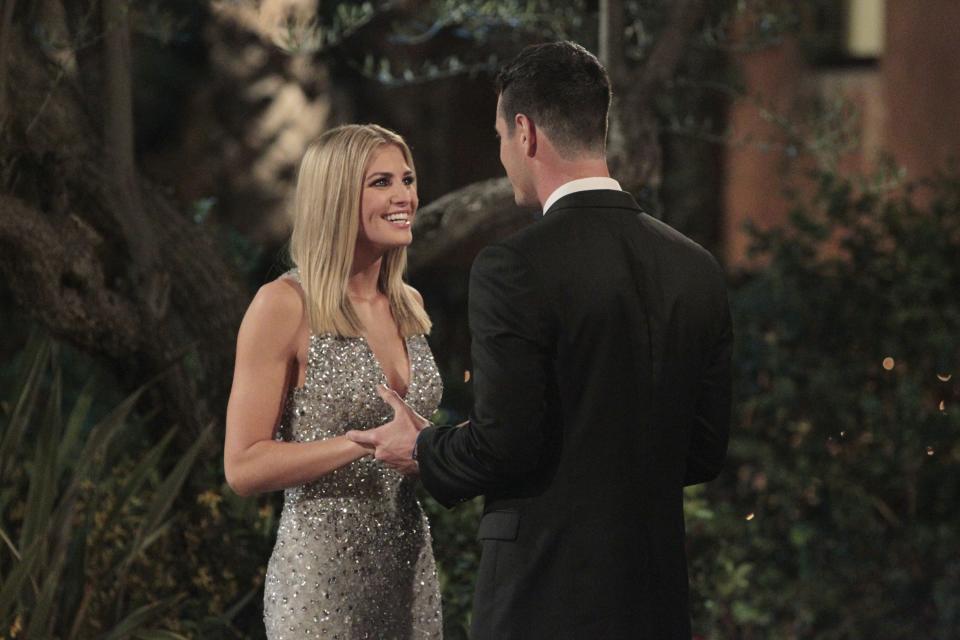
ABC's "The Bachelor" - Season 20
There were tabloids printing lies about me, people spreading rumors, tweeting mean GIFs of me…. It was just a lot to take in, and none of it was positive. It was the lowest I’ve been in my life, and I honestly started to believe the terrible things people were saying about me. It was something that I knew I needed to look away from, so I asked my sister to change the passwords of my accounts.
The way viewers tweet about The Bachelor definitely has affected my view of the entire experience. I understand wanting to live-tweet and laugh at some of the goofy things people say, but it was horrible to learn the lengths people would go to. It made me sad, because I grew up loving this show and feeling like I had a community of people who loved the entertainment. But I felt like that same community turned on me in an instant.
Rachel Lindsay
Rachel Lindsay first appeared on Nick Viall’s season of The Bachelor in 2017 and was selected to be the Bachelorette the following year, becoming the first black lead for the franchise. She is currently planning a wedding with Brian Abasolo, who received her final rose.
As the lead, it's your show. It's your job to not only be vulnerable in your journey for love, but to help others figure themselves out too. And so you’re held to a different standard. I was fearful about being the first black lead that the franchise ever had. I didn't know how [the show] would handle it, I didn't know how the audience would accept it, and I just didn't know if I wanted to be—for lack of a better word—the test dummy for that. But I felt that this role was bigger than me. I felt it was bigger than just finding love. I thought, You know what? Why not?
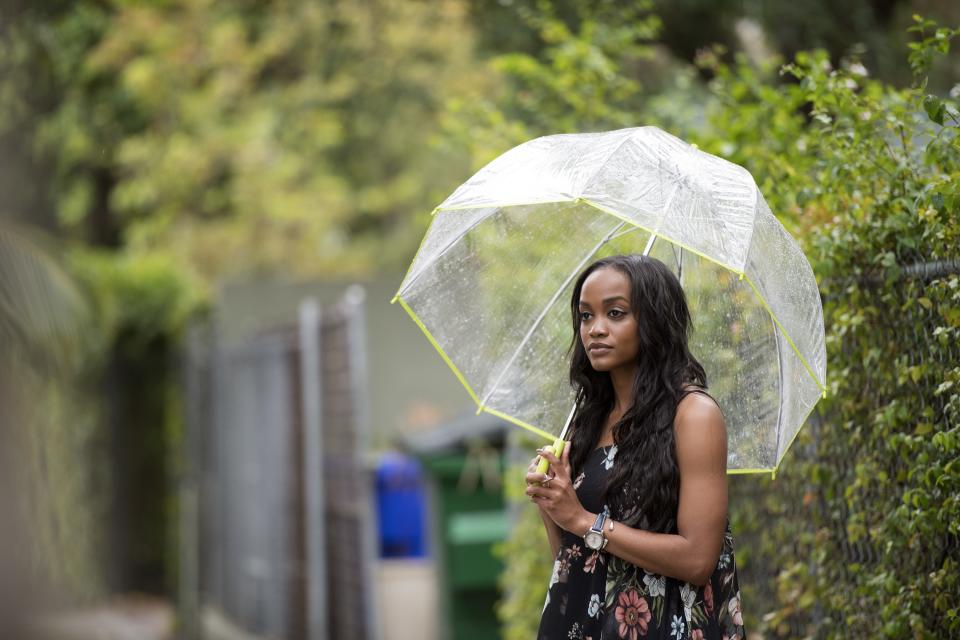
ABC's "The Bachelorette" - Season 13
On social media I'm criticized a lot because I'm black or because I'm in an interracial relationship. That is something no other lead can even begin to understand in the way that I have. I'm used to being counted out, not necessarily coming from the privilege that my counterparts have enjoyed while being the lead of the franchise. I'm not a stranger to people questioning who I am simply because of the way that I look or because I'm different. It wasn’t foreign to me to be criticized for something; granted, it was on a bigger level, and it was in a way that I hadn't seen before because I wasn't very big on social media prior to the show. But it wasn't anything that was traumatizing for me, because I'm used to the struggle.
However, I think people who write these negative, hateful, or harassing things toward us feel empowered behind their keyboard in a way that they would never approach me in person. I think they want to feel powerful in a way that they may not feel in real life.
Annaliese Puccini
Annaliese Puccini was first seen on Arie Luyendyk Jr.’s season in 2018 and returned for Bachelor in Paradise that same year. While on The Bachelor, she revealed a few traumatic childhood incidents that were portrayed on the series as dramatic reenactments.
Prior to the show I was not concerned about the reactions from social media. However, I was quite nervous after my time on The Bachelor to see how viewers reacted, especially when I saw how some things were edited. I had two things come up during the show that I never thought would: a traumatic bumper car experience and a dog bite attack. I did get an overwhelming positive response about them, but I also got lots of insensitive messages and comments. Trauma can come from literally anything, and I’m not ashamed.
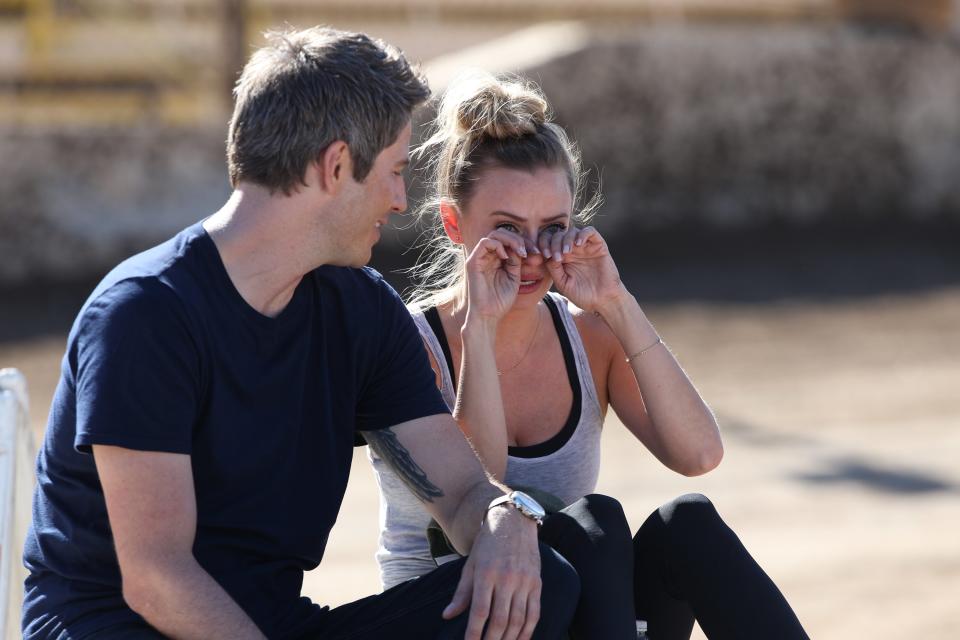
ABC's "The Bachelor" - Season 22
My experience on Paradise was very different. I was in a very different headspace. I always felt like I had a bit of a perfection complex before going on the show, and after my experience on The Bachelor, I felt like America had seen me as imperfect. So going into Paradise I felt very liberated, like I didn’t need to live up to anything or try to be perfect.
Astrid Loch
Astrid Loch was a contestant on Nick Viall’s season of The Bachelor in 2017. She returned to the franchise as a Paradise contestant in 2018, when she started a relationship with costar Kevin Wendt. They are still dating.
I had no idea how big Bachelor Nation and the social media following could be—it seems like everyone has an opinion. The strangest thing about watching the show back and reading people’s commentary was that it seems nothing is off limits. Whether it was my name, my looks, or the things I said, people didn’t hold back. I only made it about halfway on my season of The Bachelor, so thankfully, I got off pretty unscathed and had it easy compared to some of the other girls.
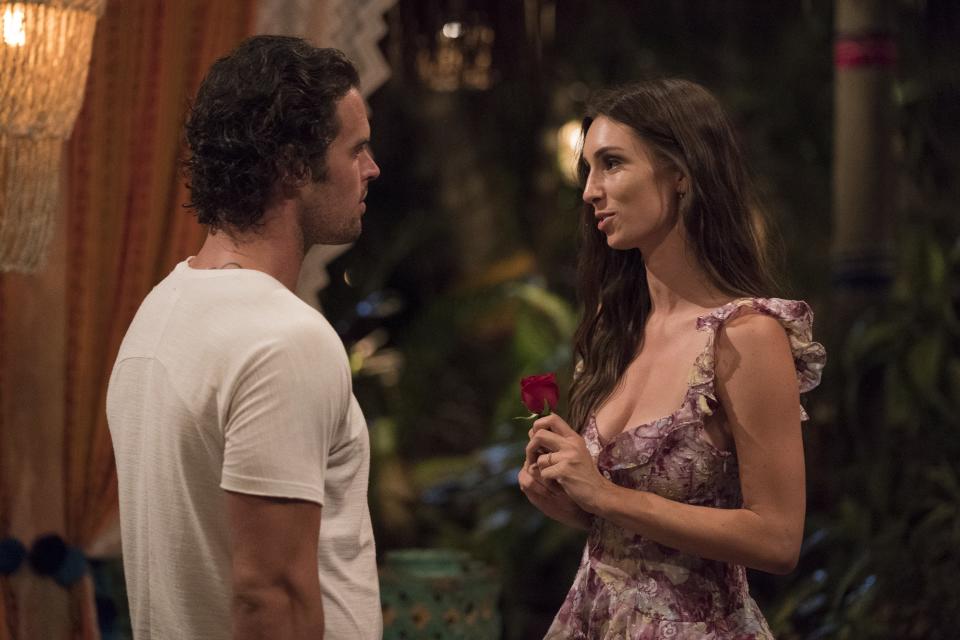
KEVIN, ASTRID
On Paradise I wasn’t just dealing with people’s opinions of me but also their opinions of Kevin. The night our breakup aired really showed how quickly people could change. People went from loving Kevin to hating him and then again loving him only 24 hours later, when they saw we were back together. It really showed how much of social media is people just letting out their frustration without a filter.
But I definitely don’t regret doing the show, and I realize that I’ve been lucky compared to other contestants with how I’ve been perceived. If anything, it has changed the way I look at social media as far as not putting so much value in what I see on Instagram.
Kendall Long
Kendall Long made it to the fantasy suites episode of Arie Luyendyk Jr.’s season of The Bachelor in 2018 and returned for Paradise later that year. Long began dating fellow Paradise contestant Joe Amabile, a.k.a. “Grocery Store Joe.” They are currently still together.
In the beginning of The Bachelor, I was known as the "taxidermy weird one." That was my first experience with the negativity of fans. People would say that I was an animal killer, that I was really weird. A lot of the negative opinions came from a lack of understanding of what I actually did or what I was actually into. I'm a huge animal lover; I'd never kill an animal, and I only collect reputable pieces or vintage pieces.
At first, I was really shocked and hurt. My friends and family would try to defend me on social media. That always put the fire underneath the cot and made it more intense. It just got louder and louder.
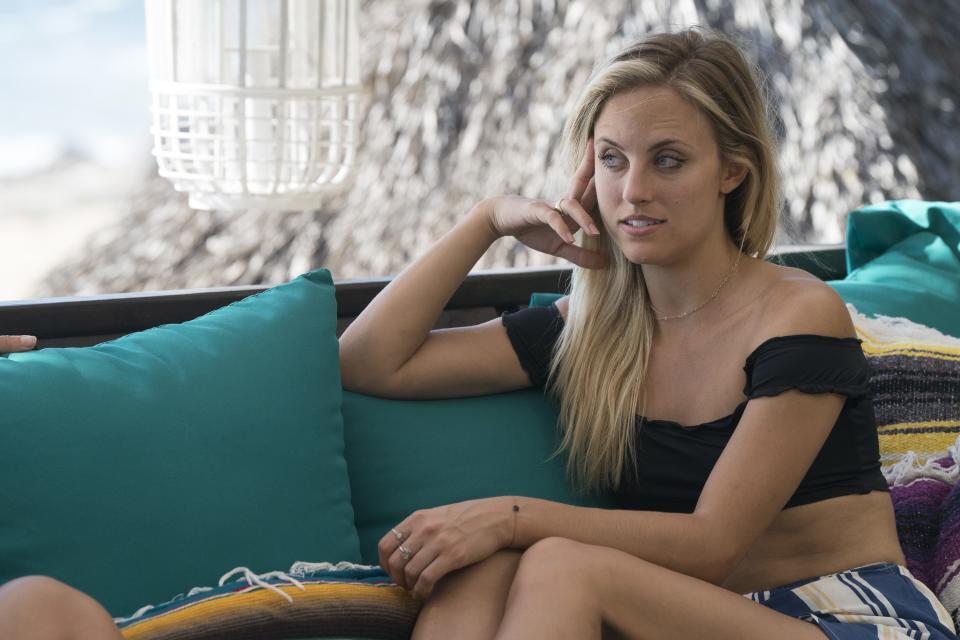
ABC's "Bachelor in Paradise" - Season Five
Watching Paradise back was crazy, because Joe and I did end up together. [Editor's note: They briefly broke up during filming.] Viewers would get upset, having really strong opinions about who you should date, and why you should date them. I know how I feel, and I know how I felt when everything went down. Joe and I had already talked about everything, and we were completely transparent the entire time [while filming]. We already figured it out.
But everyone else hadn't figured it out yet. Everyone else wasn't at peace with it yet. I felt that I had to apologize to Joe and go through everything with him, but not just that: I had to apologize and go through it with everybody else who watched the show. It felt like everyone expected something from me in the form of an apology or an explanation. And that's literally impossible to do with that amount of people.
The thing about The Bachelor and social media is that I can turn off Instagram, and the comments don’t exist anymore. I don't have to constantly see them if I don't choose to.
Katie Morton
Katie Morton was a contestant on Colton Underwood’s season of The Bachelor. In the "Women Tell All" episode, she claimed that two other contestants, Cassie Randolph and Caelynn Miller-Keyes, were overheard talking about becoming the next Bachelorette. Later Morton opened up on social media about receiving racist comments from viewers in response to her conflict with Miller-Keyes.
I knew that going on The Bachelor meant putting my life and those that are close to me in the public eye. My overall experience while the show was airing was great. The majority of the people approaching me on social media were kind and supportive, but I did receive hurtful messages. The ones that hurt the most were those regarding my race or my physical appearance.
I'm so proud of those who raised me and my background, so it hurts to hear people talk about how big my nose is and call me names that no one deserves to hear. This isn't my first time hearing these things about myself. I've been asked why my nose is so big since fourth grade.
The volume of messages was really effective. I am a confident person overall, but I will admit I gave myself a few double takes in the mirror after that and heavily analyzed my face. But I always left the mirror with a positive affirmation because I think that's very important. I'm proud of who I am.
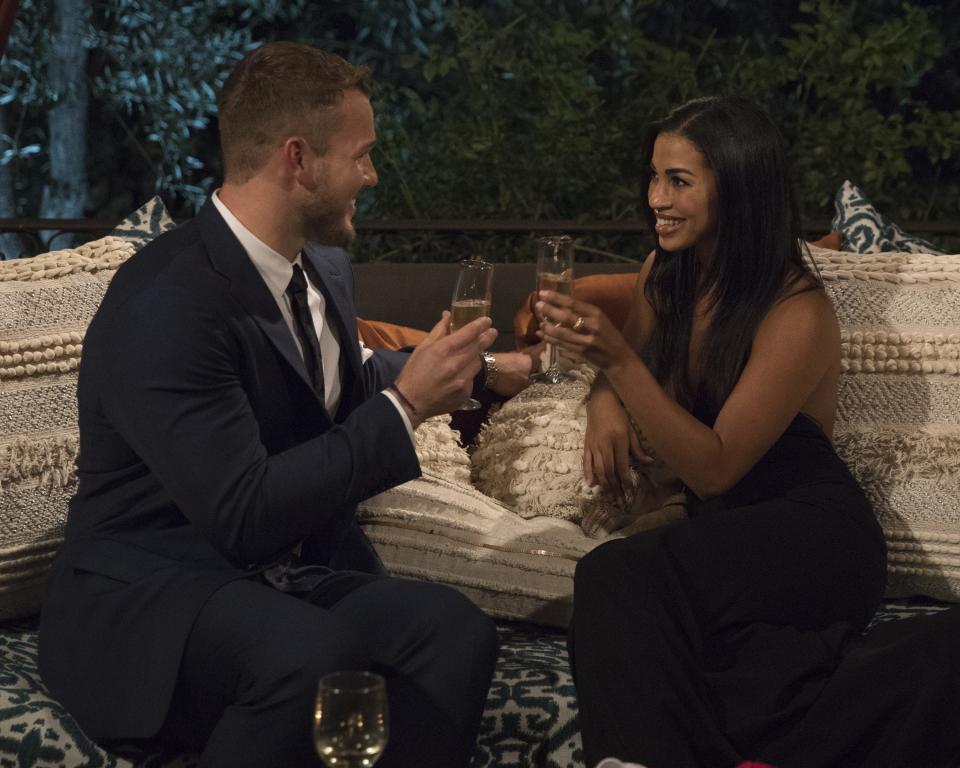
ABC's "The Bachelor" - Season 23
When I tweeted during the “Women Tell All” about the negative comments, I was thinking: You know what? I have a large number of people listening to me right now, why not just tell them exactly how I feel? I felt mad. I felt sad. I felt like we all took huge steps back. I think that attacking someone because of the color of their skin is absolutely unacceptable, and I wanted to make sure people knew I would never let it slide.
I experienced so much personal growth from participating on The Bachelor that there's no chance I would ever take it back. People are keyboard warriors. It's so easy to allow one negative message to hold weight and forget about the hundreds of positives. That goes with everything in life. My advice is: Set your standards, choose wisely, educate, be respectful—and never reply while angry.
Glamour has reached out to ABC for comment. These interviews have been condensed and edited for clarity.
De Elizabeth is a writer and editor specializing in pop culture, mental health, and anything related to Pretty Little Liars.
Originally Appeared on Glamour

